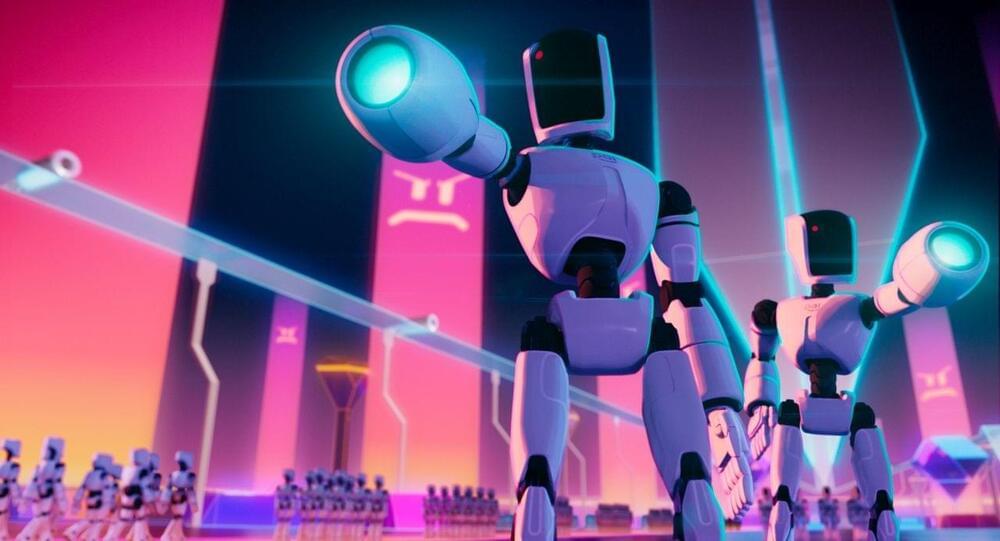In efforts to construct a map of neural connections in the brain, researchers at the Flatiron Institute’s Center for Computational Neuroscience are turning to a… See more.
Watch: building the ultimate brain map on simons foundation.


I subtitled this post “Why we’re all in denial about the robot apocalypse”. I say that because I believe that society at large is completely, utterly, and woefully unprepared for the advent of sentient, living artificial general intelligence. I think the singularity is coming much sooner than most people expect, and I think it’s going to cause a great deal of upset when it arrives — for better and for worse.
Take for instance the common religious belief that people possess some unmeasurable, undefinable soul, and that this soul is what separates us from inanimate objects and non-sentient animals. Furthermore, some people believe that these souls come from deity. I have spoken with friends who believe that AGI is impossible because “robots can’t have souls, humans aren’t God”. For these people, like Caleb says in Ex Machina (paraphrasing), removing the line between man and machine also removes the line between god and man.
Now, this isn’t to say that AGI will destroy religion or anything — it may even be used to strengthen some sects (as taken to the extreme in HBO’s Raised By Wolves). No, religion has been around for millennia and I’m sure it will continue to be around for many more millennia. I’m simply predicting that a subset of religious people are going to experience lots of cognitive dissonance when the first AGI arrives.
AI will completely take over game development by the early 2030s. To a point where there will be almost no human developers. Just people telling AI what they want to play and it builds it in real time.
Over the past few years we’ve seen massive improvements in AI technology, from GPT-3, AI picture generation to self-driving cars and drug discovery. But can machine learning progress change games?
Note: AI has many subsets, in this article when I say AI I’m referring to machine learning algorithms.
First important question to ask is, will AI even change anything? Why use machine learning when you can just hardcode movement and dialogues? The answer to this question can be found in replayability and immersive gameplay.

Will they able to make good use of this land?🤔🤔.
The Rappahannock Tribe, a Native Tribe in Virginia, has reacquired 465 acres of sacred land at Fones Cliff.
Secretary of the Interior Deb Haaland and US Fish and Wildlife Service Director Martha Williams celebrated the tribe’s reacquisiton of the land Friday, according to a press release from the Department of the Interior.
“We have worked for many years to restore this sacred place to the Tribe,” said Rappahannock Tribe Chief Anne Richardson, according to the Chesapeake Conservancy. “With eagles being prayer messengers, this area where they gather has always been a place of natural, cultural and spiritual importance.”

In the new field of quantum computing, magnetic interactions could play a role in relaying quantum information.
In new research, Argonne scientists achieved efficient quantum coupling between two distant magnetic devices, which which may be useful for creating new quantum information technology devices — https://bit.ly/3uk88Q3

They come in many colors: golden, solid onyx, or striped dandelion and cinnamon. Their eyes can be beady black, slate gray, or even bluish-green. Their bodies may be as small as lentils or big as wine grapes. But the most amazing thing about stingless bees are the honeys they produce, which are increasingly being sought after for food and medicine.
In the Peruvian Amazon, people are just beginning to raise a few of the area’s 175 different species of stingless bees, which promise to help beekeepers and their communities. Historically, such honey has typically been harvested from the wild, which destroys the hives.
But in the last few years, scientists including Cesar Delgado, with the Instituto de Investigaciones de la Amazonía Peruana (IIAP), are teaching people to raise and keep the insects in sustainable ways.

The Hubble Space Telescope has smashed a record, identifying its most distant star ever. The star is so far away that its light has taken nearly 13 billion years to reach us, meaning it is from the first one billion years after the Big Bang.
Hubble’s previous record for farthest star observed, set in 2018, was for a star from 4 billion years after the Big Bang. So this new finding is a considerable step older and was only observable thanks to a fortuitous cosmic alignment. “We almost didn’t believe it at first, it was so much farther than the previous most distant, highest redshift star,” said astronomer Brian Welch of the Johns Hopkins University in Baltimore, lead author of the paper, in a statement.
The star in question, named Earendel, which means “morning star” in Old English, is massive, coming in at at least 50 times the mass of our sun. It is also millions of times brighter. However, even allowing for its mass and brightness, it is so far away that it was only possible to observe it thanks to a huge galaxy cluster that passed between it and us. The cluster’s gravity is so large that it warps the light coming from the star and acts as a magnifying class.

Like two great songwriters working side by side and inspiring each other to create their best work, the Magellanic Clouds spawn new stars every time the two galaxies meet.
Visible to the naked eye but best seen from the Southern Hemisphere, the Large and Small Magellanic Clouds are by far the most luminous of the many galaxies orbiting the Milky Way. New observations reveal that on multiple occasions the two bright galaxies have minted a rash of stars simultaneously, researchers report March 25 in Monthly Notices of the Royal Astronomical Society: Letters.
Astronomer Pol Massana at the University of Surrey in England and his colleagues examined the Small Magellanic Cloud. Five peaks in the galaxy’s star formation rate — at 3 billion, 2 billion, 1.1 billion and 450 million years ago and at present — match similarly timed peaks in the Large Magellanic Cloud. That’s a sign that one galaxy triggers star formation in the other whenever the two dance close together.
With the web of undersea cables lacing the continents together now, it’s hard to imagine that it wasn’t until 1956 that the first transatlantic telephone cable was laid. Sure, there were telegraph cables under the Atlantic starting as early as the late 1800s, but getting your voice across the ocean on copper was a long time coming. So what was the discerning 1930s gentleman of business to do when only a voice call would do? He’d have used a radiotelephone, probably at an outrageous expense, which as this video on the receiving end of the New York to London radio connection shows, was probably entirely justified.
The video details the shortwave radiotelephone system that linked New York and London in the 1930s. It starts with a brief but thorough explanation of ionospheric refraction, and how that atmospheric phenomenon makes it possible to communicate over vast distances. It also offers a great explanation on the problems inherent with radio connections, like multipath interference and the dependency on the solar cycle for usable skip. To overcome these issues, the Cooling Radio Station was built, and its construction is the main thrust of the video.
Built on Cooling Marshes along the Thames well outside of London, the receive-only radio station was a gigantic undertaking. It consisted of a two-mile-long rhombic array antenna, pointed directly at the transmitting site in Lawrenceville, New Jersey. The pool-table-flat marshland made for a perfect place for the array; the fact that the ground was saturated with brackish tidal water had the added benefit of excellent electrical conduction, too. The amount of work it took to raise the antenna masts and booms is impressive — very little power equipment was used. And we loved the details about the hardline coaxial used to stitch the antennas together — it was made on-site from copper tube and insulating spacers.

What do quantum computers have to do with smog-filled London streets, flying submarines, waistcoats, petticoats, Sherlock Holmesian mysteries, and brass goggles?
A whole lot, according to Nicole Yunger Halpern. Last week, the theoretical physicist joined Jacob Barandes, co-director of graduate studies for physics, to discuss her new book, “Quantum Steampunk: The Physics of Yesterday’s Tomorrow.” In it, Yunger Halpern dissects a new branch of science—quantum thermodynamics, or quantum steampunk as she calls it—by fusing steampunk fiction with nonfiction and Victorian-era thermodynamics (the heat and energy that gets steam engines pumping) with quantum physics. Yunger Halpern presents a whimsical lens through which readers can watch a “scientific revolution that’s happening in real time,” Barandes said, exploring mysteries even Holmes couldn’t hope to solve, such as why time flows in only one direction.
“This fusion of old and new creates a wonderful sense of nostalgia and adventure, romance and exploration,” Yunger Halpern said during a virtual Harvard Science Book Talk presented by the University’s Division of Science, Cabot Science Library, and Harvard Book Store. In steampunk, she continued, “fans dress up in costumes full of top hats and goggles and gears and gather at conventions. What they dream, I have the immense privilege of having the opportunity to live.”